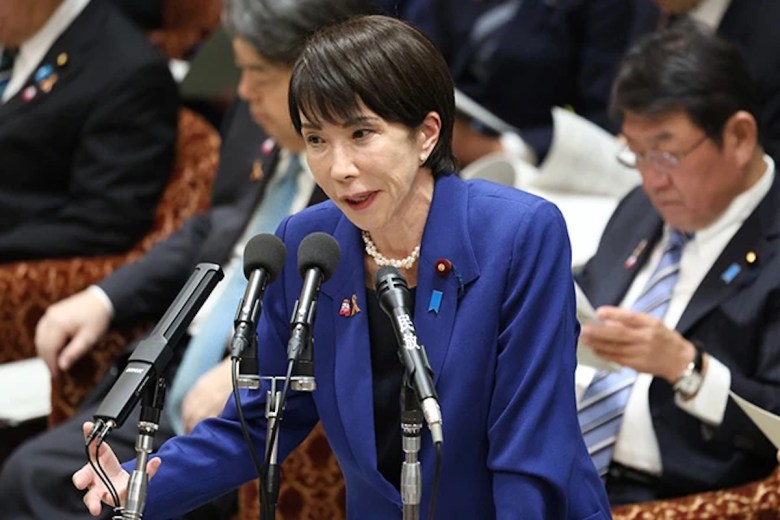Politics
Japan and China Clash Over Takaichi’s Taiwan Comments

The diplomatic tension between Japan and China escalated following remarks made by Japanese Prime Minister Sanae Takaichi regarding Japan’s potential role in a Taiwan contingency. The Japanese government expressed dissatisfaction with China’s recent travel warning for its citizens, which was issued in response to Takaichi’s comments. This exchange involved both nations summoning each other’s ambassadors for formal reprimands, further straining relations.
On Friday, Japan’s Ministry of Foreign Affairs summoned China’s ambassador to lodge a protest, a move that followed a similar action taken in Beijing against Japan’s ambassador. Although internal pressure mounts from factions within the Liberal Democratic Party (LDP) and Ishin no Kai to declare Xue Jian, China’s consul-general in Osaka, persona non grata, the Takaichi government appears hesitant to escalate tensions further. The current climate raises questions about the feasibility of improving Japan-China relations in the foreseeable future.
Japan’s Economic Strategy and Fiscal Plans
Amid these diplomatic challenges, the Takaichi administration is reportedly preparing a substantial fiscal stimulus package aimed at addressing public concerns related to the rising cost of living. Current estimates suggest the package could reach JPY 17 trillion, surpassing last year’s JPY 13.9 trillion package. The proposed budget focuses on familiar pillars, including tax reductions, increased defense spending to achieve a target of 2% of GDP this fiscal year, and initial strategic investments in key sectors.
This new package represents the largest supplemental budget since 2013, excluding those enacted in response to the COVID-19 pandemic. Takaichi’s approach indicates a notable shift in Japan’s fiscal policy, as she aims to “remove restraints” on spending, a move that could lead to larger budget deficits despite hopes of increased tax revenue to support such expansions. Former finance minister Taro Aso has expressed a desire for discussions to center on regulatory reforms rather than mere allocations, highlighting the ongoing debate over fiscal responsibility within the government.
Strengthening National Security Initiatives
The late Prime Minister Shinzo Abe laid the groundwork for a stronger national security framework in Japan, and the Takaichi administration is poised to continue this trajectory. The LDP and Ishin no Kai have already agreed to pursue the establishment of a national intelligence agency. On November 14, the LDP convened its Intelligence Strategy Headquarters for initial discussions on legislation intended to be submitted to the Diet in 2026.
Moreover, the party is contemplating counterespionage legislation akin to the US Foreign Agents Registration Act (FARA). Takaichi reiterated her support for this initiative during parliamentary discussions on November 13. Also on the agenda is the potential drafting of legislation to create a Japanese equivalent of the Committee on Foreign Investment in the United States (CFIUS).
The Takaichi government is also preparing to revisit Japan’s nuclear weapons policy. An update to three national security documents is scheduled for 2026, and discussions could emerge regarding Japan’s three non-nuclear principles, which state that Japan will not make, possess, or permit the introduction of nuclear weapons. During the 2024 LDP leadership election, Takaichi suggested modifying these principles to allow for the introduction of US nuclear weapons, following Abe’s earlier comments on nuclear sharing.
Debate on this topic is likely to intensify, as evidenced by comments from Yoshihiko Noda, leader of the Constitutional Democratic Party, who has stated that the three principles should be maintained.
As the LDP marks its 70th anniversary on November 15, the party reflected on its history as a national force while acknowledging the significant challenges posed by current geopolitical dynamics. The LDP held a committee meeting on November 14 to draft a vision statement for its future, aiming to guide the party’s direction through its centenary in 2055.
The anniversary comes at a pivotal moment, prompting discussions of how the party will navigate this existential crisis compared to its previous challenges.
In summary, while Japan grapples with both diplomatic tensions with China and significant domestic economic and security initiatives, the political landscape remains complex and fluid. The coming months will likely determine the trajectory of Japan’s foreign policy and domestic fiscal strategy, amidst the backdrop of regional security concerns and internal party dynamics.
-

 Lifestyle4 months ago
Lifestyle4 months agoHumanism Camp Engages 250 Youths in Summer Fest 2025
-

 Business4 months ago
Business4 months agoKenvue Dismisses CEO Thibaut Mongon as Strategic Review Advances
-

 Sports4 months ago
Sports4 months agoDe Minaur Triumphs at Washington Open After Thrilling Comeback
-

 Top Stories4 months ago
Top Stories4 months agoColombian Senator Miguel Uribe Shows Signs of Recovery After Attack
-

 Sports4 months ago
Sports4 months agoTupou and Daugunu Join First Nations Squad for Lions Clash
-

 Health4 months ago
Health4 months agoNew Study Challenges Assumptions About Aging and Inflammation
-

 World4 months ago
World4 months agoASEAN Gears Up for Historic Joint Meeting of Foreign and Economic Ministers
-

 Business4 months ago
Business4 months agoOil Prices Surge Following New EU Sanctions on Russia
-

 Entertainment4 months ago
Entertainment4 months agoDetaşe-Sabah Violin Ensemble Captivates at Gabala Music Festival
-

 Entertainment4 months ago
Entertainment4 months agoBaku Metro Extends Hours for Justin Timberlake Concert
-

 Business4 months ago
Business4 months agoU.S. House Approves Stablecoin Bill, Sends to Trump for Signature
-

 Top Stories4 months ago
Top Stories4 months agoRethinking Singapore’s F&B Regulations Amid Business Closures









